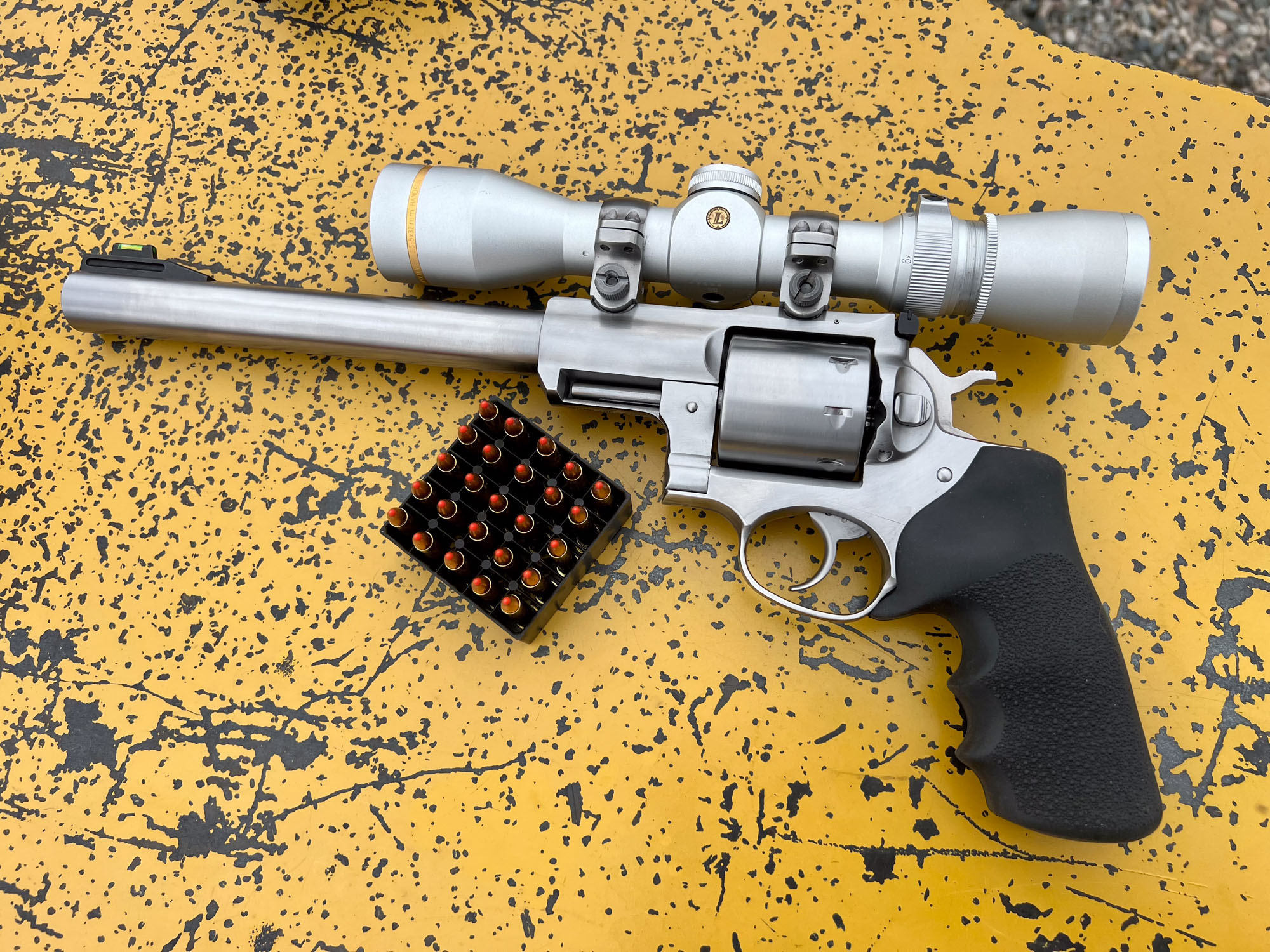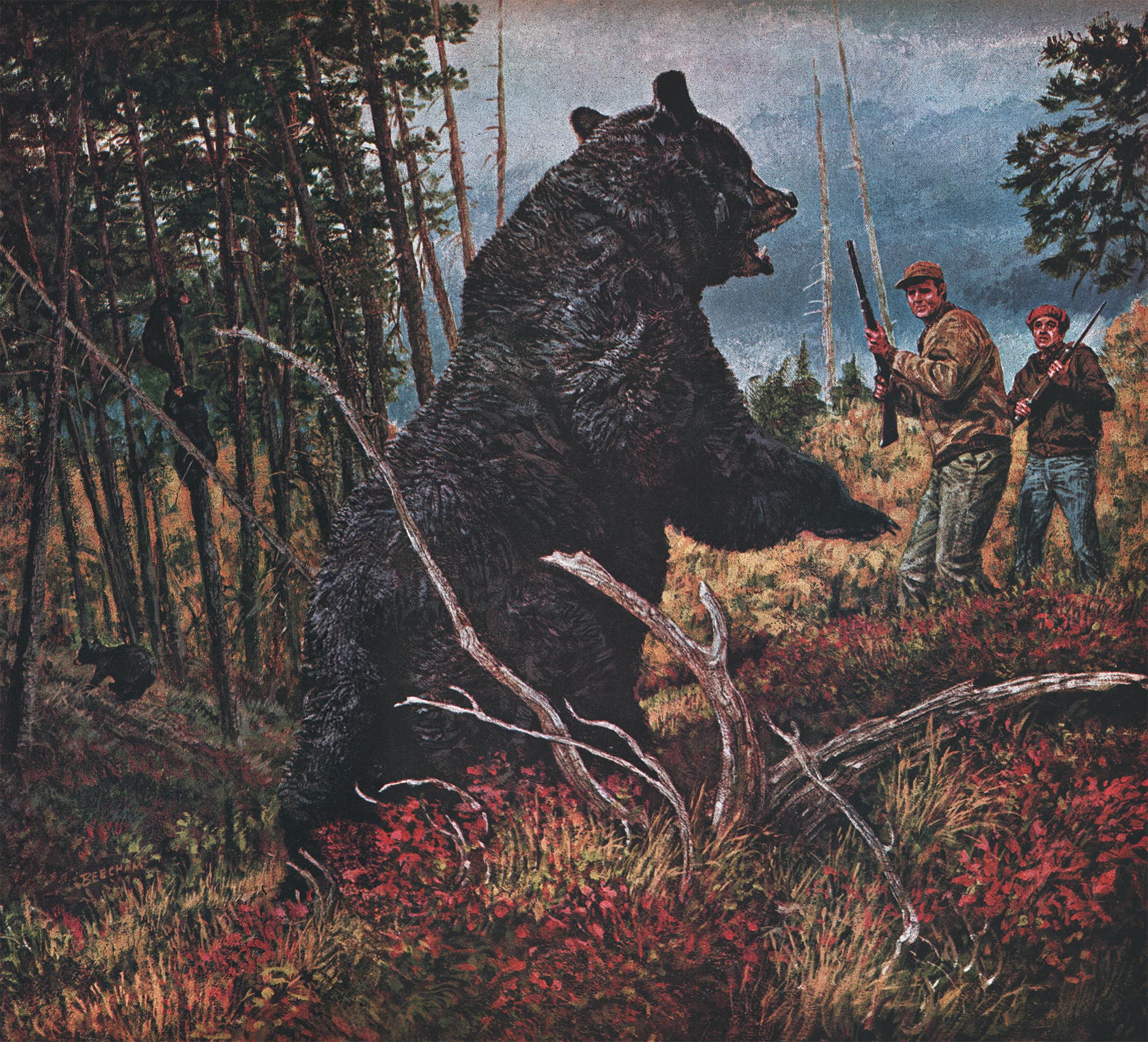Ruger Super Redhawk in 22 Hornet, Tested and Reviewed

We may earn revenue from the products available on this page and participate in affiliate programs. Learn More ›
The Ruger Super Redhawk in .22 Hornet is my favorite type of gun. It isn’t one I need, but it sure as hell is one I want. This 8-shot, double-action revolver exists to provide pleasure, nothing more. Any practical task you devise for it can be better accomplished by some other firearm. But this wheelgun doesn’t play by the rules of cold logic. It is pure id, turning gunpowder into happy thoughts with each pull of the trigger.
See It
See It
Pros
- Smooth action
- Reliable
- Accurate
Cons
- Heavy
- Clunky grip
- Stiff trigger pull
Specs
-
Cartridge
22 Hornet -
Capacity
8 -
Barrel
9.5 inches, 1:9 twist -
Weight
66 ounces (empty, unscoped) -
Price
$1362
Key Features
-
Eight shot capacity -
Integral scope ring mounts -
9.5-inch hammer-forged bull barrel
Combining Two Legends
I remember the Ruger Super Redhawk debut back in 1987, when the first models in .44 Remington Magnum rolled off the production line in New Hampshire. Bill Ruger Sr. was still at the helm of the company and everything Ruger produced had to meet his tastes and standards. He loved the Super Redhawk for the value and quality it represented compared to similar offerings from Smith & Wesson, produced in Massachusetts, just south of where he lived.
At nearly 40 years old, the Super Redhawk has achieved classic status, but it pales compared to the 22 Hornet’s legacy. The Hornet was developed in the 1920s as a wildcat based off the, now obsolete, 22 W.C.F. by rifle nerds including Outdoor Life Shooting Editor Townsend Whelen. In 1930, Winchester made the 22 Hornet an official offering, and in 1933 the first production rifles chambered in the cartridge were built.
22 Hornet in Context
In the years bracketing World War Two, the 22 Hornet was a top pick for performance-minded riflemen. It was a major step up from its parent case, the 22 W.C.F. — part of the Winchester Center Fire family. The 22 W.C.F., launched in 1885, was loaded with black powder, limiting velocities to around 1,500 fps with a 45-grain cast lead bullet. The use of black powder as a propellant is also why the case has a shallow 5-degree, 38-minute shoulder. That long, sloping taper aided extraction when a chamber was clogged with grimy black powder residue. It gained traction for varmints and small game and was chambered in rifles like the Winchester 1885 single shot and the Remington’s No. 7 Rolling Block.
Wildcatters like Townsend Whelen sought to jazz up the 22 W.C.F. with smokeless powders which would boost muzzle velocities and leave less fouling in the bore. The first Hornets used .223-inch jacketed bullets but later ammo manufacturers and reloaders switched to .224-inch bullets, which is what we still employ today. The case dimensions of the 22 Hornet and 22 W.C.F. are nearly identical, though the Hornet’s brass is slightly longer (1.403 inches vs. 1.390 inches), the rim is slightly wider (.350 inches vs. .342 inches), and the overall cartridge length is greater (1.723 inches vs. 1.61 inches).
A Marvel of Accuracy and Speed
Shooting a similar 45-grain bullet, the 22 Hornet’s muzzle velocity outclassed the 22 W.C.F.: 2690 fps vs. 1550 fps. It also gained a reputation for sterling accuracy. Winchester’s engineers allegedly reported that it was the most accurate round they’d ever shot.
While the diminutive case size and modest allowable pressure (49,000 psi) didn’t put the Hornet in the same category as the .220 Swift, .22/250 Rem., and other potent .224-caliber varmint rounds, it carved out niche that has endured over the decades. It was the first purpose-built varmint round of the smokeless powder era and was effective on critters to 200 yards while having moderate recoil and a long barrel life.
22 Hornet in the Super Redhawk
One of the initial selling points of the Super Redhawk is the inclusion of integral mounting points for scope rings. The 22 Hornet model comes with a nice set of iron sights, a green fiber-optic dot in a squared off black post up front, and a square-notched rear sight outlined in white that is adjustable for windage and elevation at the rear. That said, I think most shooters will want to run it with a magnified optic of some sort to take full advantage of the round.
The .22 Hornet is right at home in Ruger’s robust double-action platform. Built for powerhouses like the 44 Magnum, 454 Casull, 480 Ruger, and 10mm Auto, the stainless steel framed revolver has no problems accommodating the 22 Hornet.
Ruger includes a pair of one-inch stainless steel rings with the revolver, which I used to mount a Leupold VX-III 2.5-8x32mm Handgun scope. Unfortunately, this scope isn’t being produced currently so you’ll be forced to do what I did and peruse the used market. I managed to snag one with a matte silver finish that pairs nicely with the brushed stainless steel on the revolver, but standard black would match as well.
Shooting the Ruger Super Redhawk in 22 Hornet
The trigger pull on the revolver isn’t light, but in single-action mode — which is how I did all of my accuracy testing — the trigger broke crisply with no creep. As soon as I hit the requisite 5 pounds, 10 ounces of pressure, the sear broke loose and tripped the shot.
The hammer has a checkered flat on its spur that is positioned low enough to provide plenty of clearance beneath the scope, allowing easy cocking. Like other Super Redhawks, and the Ruger GP 100 series that it is based on, the trigger has a transfer bar system to help prevent accidental discharges.
When cocked for single-action shooting the hammer locks up tight, with no wiggle or movement. The cylinder is solid as well, with no side-to-side play and minimal rotational movement. In addition, the cylinder gap — the small space between the face of the cylinder and the back of the barrel remains even and consistent as you rotate through all eight charging holes on the cylinder. All of this is desirable in a revolver and speaks to the Ruger’s quality.
22 Hornet Accuracy
There aren’t many factory 22 Hornet loads offered today, and I shot the two I could get my hands on: the Hornady 35-grain V-Max and a Remington 45-grain SP. The 35-grainers out-shot the 45-grain soft points by a wide margin. From a solid bench with a sandbag support, I shot groups at 50 yards with both loads, and because of how well the Hornady load did, I printed a 20-shot group at 100 yards as well.
The Remington ammunition had a difficult time grouping on the target at 50 yards, so instead of aggregating four 5-shot groups to create a 20-shot group (as I did with the V-Maxes) I stopped shooting for group size after two five-shot strings that looked more like buckshot patterns than proper groups.
| Ammo | Distance | 5-Shot Group Avg. | 20-Shot Group ES | Mean Radius | MV (fps) | ES (fps) | SD (fps) |
| Hornady 35-gr V-Max | 50 yd. | 1.638 in. | 2.20 in. | 0.63 in. | 2114 | 109 | 25.9 |
| Hornady 35-gr V-Max | 100 yd. | n/a | 4.53 in. | 1.18 in. | 2109 | 147 | 28.2 |
| Remington 45-gr SP | 50 yd. | 4.55 in. | n/a | n/a | 1836 | 209 | 57.4 |
The velocities I recorded from the 35-grain load were remarkably consistent. The average muzzle velocity with the first 20 shots was 2114 fps and was 2109 fps with the second string. The ES and SD values were also consistent: 109 fps ES and 25.9 fps SD for the first 20-shot string, and 147 fps ES and 28.2 fps SD for the follow-up.
From a practical standpoint these variations in velocity won’t make a difference. At 50 yards or closer the Ruger is deadly on any small varmint, and it is fully capable out to 100 yards, though you’ll probably miss some skinnier ground squirrels. I can’t recommend the factory 45-grain load for anything based on my testing.
In comparison to the 2110 fps that the Ruger generates from its 9.5-inch barrel, when the 35-grain V-Maxes are shot through my 24-inch-barreled Winchester Model 70 those MVs jump more than 1000 fps to 3175 fps on average.
Double-Action Shooting
I shot the revolver in double-action mode too and found I could control the crosshairs pretty well through the longer, heavier trigger pull. I used two techniques during this part of the evaluation. The most frequently recommended method is to follow all the way through with a smooth, steady trigger pull until the hammer falls. With this technique once you’ve committed to the shot you don’t hesitate or alter the trigger press. Focus on moving that trigger in a dead straight line to the rear while maintaining your grip and your sight picture.
With a bit of practice anyone can become good at this method, but to really master it requires serious dedication. Shooting a double-action revolver accurately this way is one of the most difficult skills a handgunner can pursue.
The other technique is to stack the shot by pulling back on the trigger and pausing when the cylinder rotates a fresh cartridge into position with the hammer poised and ready to fall. The final amount of movement required to break the shot is heavier than a true single-action shot but is shorter and lighter than the full double-action movement. It’s easier to do this with some revolvers than others depending on how the action is tuned and how responsive the gun is.
With the Super Redhawk it was easy to find the “shelf” between the initial trigger pull and the final portion of the shot. Note that you must practice this extensively with dry fire before trying it with live ammunition, and never start that trigger pull unless you’re ready and willing to break the shot because there’s a chance you’ll run past that shelf and discharge the gun.
Desirable Upgrades
The Super Redhawk comes stocked with black rubber grips that are molded with textured panels on either side and deep finger grooves. They provide a secure handhold, and many people prefer this type of grip when shooting heavy-recoiling cartridges like the 44 Magnum.
These grips on the Super Redhawk in 22 Hornet are overkill and are not my favorites. They don’t look nearly as nice as a set of well-made wood grips, like these cocobolo beauties from Hogue, and they feel clunky and awkward when shooting something as mild as the 22 Hornet.
Fortunately, they are easy to replace, which is one of the two alterations I plan on making to this handgun.
The other is to swap out the springs with something lighter that will smooth out the action. You can get kits from Brownells to replace the hammer spring and trigger spring. From the factory, the hammer spring is 14 pounds, and the trigger spring measures 15 pounds. These kits include hammer springs that measure 9, 10, and 12 pounds, and trigger springs that measure 10 and 12 pounds. You mix and match the springs to find the combo that suits you, while making sure that the hammer is propelled with sufficient force to reliably ignite the round’s primer.
Operating the Super Redhawk
When running a revolver this heavy — it weighs 5 pounds, 4 ounces scoped — you’ll typically shoot it braced on something. With its 9.5-inch bull barrel, it has enough weight forward to balance nicely on the portion of the frame just in front of the trigger guard, making this a natural place to rest and steady the gun.
The cylinder release on the left side of the frame doesn’t take much effort to push down to get the cylinder to swing open. The ejector rod is enclosed in, and protected by, the frame and does a good job pushing spent brass out of the cylinder. The 22 Hornet brass from the factory wasn’t very consistent and I was happy not to have any issues when ejecting cases that got a little sticky in their charging holes.
The cylinder doesn’t have any flutes cut into it, so is smooth all the way around. It looks good and made cleaning the fouling that built up on the cylinder that much easier.
Read Next: Reloading the 22 Hornet
Final Thoughts on the 22 Hornet Ruger Super Redhawk
As I mentioned at the beginning of the review, this revolver isn’t solving any problems that another firearm couldn’t do better. It isn’t as accurate as a varmint rifle. It isn’t as handy as a rimfire wheelgun. And it isn’t potent enough to hunt big game.
But it is a lot of fun, it is reasonably accurate, and it is the kind of gun you’ll enjoy tinkering with, whether you just want to harass varmints, ring steel, or experiment with handloads. It also has a wonderful heritage — our O.G. varmint round. And that’s something that no newfangled cartridge or gun can compete with.
Read the full article here









